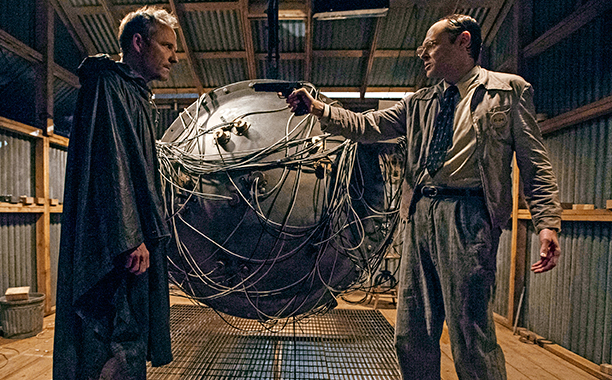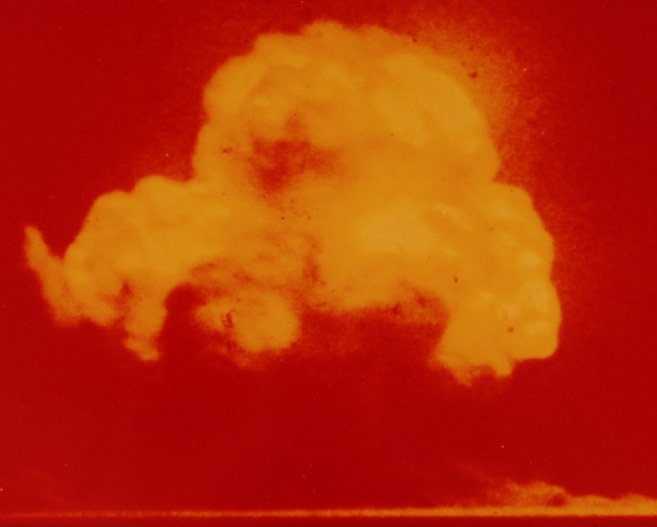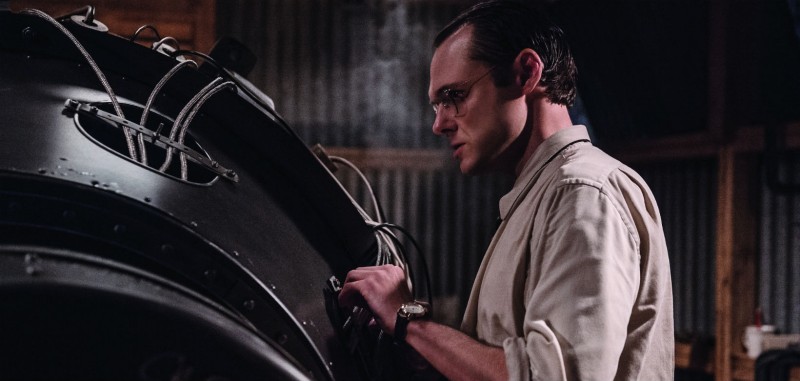In the final episode of Season 2 of Manhattan, everyone converges on the Trinity site for the world’s first test of an atomic device.
At the end of the ninth episode, Paul Crosley went to Frank with his suspicions that Jim Meeks was the Soviet spy on the Hill. Frank isn’t convinced until he tries calling Jim’s mother – whose supposed death Jim used as an excuse to meet with his handler at the end of Season 1. Sure enough, she answers the phone. Paul and Frank race off to Trinity to try to stop Jim from sabotaging the test.
Jim has second thoughts about Nora’s idea to pre-detonate the bomb and kill the project’s brain trust, but his fellow spy Stan (a.k.a. Perseus) insists on going through with the plan. When Stan searches the trunk of their car for his missing pass to the Trinity site, Jim knocks him out and leaves him by the side of the road.
As the scientists and military make their final preparations in the midst of a thunderstorm, Fritz shows up at Trinity. “Jeannie would have wanted me to be here,” he tells Liza. She recruits him to persuade Charlie to postpone the test due to the storm, which makes it more likely the Gadget will scatter radioactive fallout across New Mexico. But Charlie won’t budge. He knows a postponement is unacceptable to the military: “They’re not going to call the game for rain.”
Charlie then receives a note that Frank sabotaged the pre-test. Jim, who has just arrived, volunteers to protect the device. He climbs the 100-foot-tall tower from which the Gadget dangles – bringing us back to the cliffhanger from Episode 1.
The real Trinity test was in fact delayed by an early morning thunderstorm – to the point where Manhattan Project commander General Leslie Groves threatened to hang the meteorologist if the rain didn’t stop! (The device was not tested until the weather cleared, at 5:30am local time).
In real life, scientist Donald Hornig “babysat” the bomb before the test. He remembered:
Oppenheimer was really terribly worried about the fact that the thing was so complicated, and so many people knew exactly how it was put together that it would be easy to sabotage. So he thought someone had better baby sit it right up until the moment it was fired…
All I had was a telephone. I wasn’t equipped to defend myself, I don’t know what I was supposed to do. There were no instructions! The possibility of lightning striking the tower was very much on my mind. But it was very wet and the odds were the tower would act like a giant lightning rod and the electricity would just go straight down to the wet desert. In that case, nothing would have happened. The other case was that it would set the bomb off. And in that case, I’d never know about it! So I read my book.
When Helen arrives at Trinity, too, we learn what happened to Stan’s pass: she stole it. She is quickly taken to see J. Robert Oppenheimer. Oppie assigns her to go to the island of Tinian to help prepare the “Little Boy” uranium bomb for use against Japan.
 If Manhattan were renewed for a Season 3, it would be fascinating to see Helen on Tinian. After it was captured from the Japanese in 1944, the U.S. converted Tinian into the world’s largest air base in a matter of weeks. The island was the launching point for the B-29 raids on Japan, and ultimately the attacks on Hiroshima and Nagasaki.
If Manhattan were renewed for a Season 3, it would be fascinating to see Helen on Tinian. After it was captured from the Japanese in 1944, the U.S. converted Tinian into the world’s largest air base in a matter of weeks. The island was the launching point for the B-29 raids on Japan, and ultimately the attacks on Hiroshima and Nagasaki.
Robert Furman, the Manhattan Project’s Chief of Foreign Intelligence, was responsible for transporting half of “Little Boy” from Los Alamos to Tinian. He remembered, “I went out and received the bomb, and I remember the authorities at Los Alamos wanted a receipt that I’d received it. So I signed a receipt for an atomic bomb, which is kind of nice to frame…What I carried was really half the bomb, because if I had the whole bomb, the thing would blow up at any time under certain circumstances, so the other half was flown over.”
Back on the Hill, Abby decides to leave Los Alamos – and Charlie – once and for all. She packs her bags and talks her way past the gate, where she leaves behind Colonel Darrow’s Bible. She then meets up with her maid, Juanita, who has been taking care of her son, Joey. Abby takes him and drives towards California.
Meanwhile, Paul drops Frank off outside the Trinity site. Frank somehow sneaks his way into the tower, where he and Jim – who is busy rewiring the Gadget – have a standoff. Jim reveals he is on a suicide mission: “It’ll be over in a thousandth of a second. I’m not scared.” He then discloses what Charlie told the Target Committee about using the bomb with maximum destructiveness against a populated area.
Frank reaches the same conclusion Charlie did earlier this season: the bomb is inevitable. “They’re going to drop this thing either way. The ship has sailed, Jim. Literally…I’m through trying to predict the future. I don’t know if the world’s better off if the test fails, but I do know that if you sabotage it, your life is over.” Jim decides to let the test proceed.
Suddenly, Fritz, looking for Jim, climbs up the tower. To save Jim, Frank pretends that Jim has dissuaded him from trying to sabotage the device. Together, the three re-wire the Gadget so it will go off successfully. They drive away and reach the safety of a bunker.
In another bunker, Liza, Charlie, and the other scientists wait out the final, anxious moments before the test. Charlie dons his safety goggles; Lazar, like Edward Teller before the real Trinity test, puts on sunscreen.
Jim finally tells Fritz the truth: he is the spy and was responsible for Jeannie’s death. Fritz draws a gun and points it at his friend. Behind them, the Gadget detonates. The Atomic Age has begun.
“It worked,” Charlie breathes – the same line attributed to Oppenheimer by his brother, Frank Oppenheimer, after the test succeeded. At the sight of the mushroom cloud, poor Fritz points the gun at his own head and pulls the trigger.
 AHF has many resources related to the Trinity test. You can view rare photographs taken by Marvin Davis, an MP stationed at the Trinity site, here, and view videos from the test on our YouTube channel.
AHF has many resources related to the Trinity test. You can view rare photographs taken by Marvin Davis, an MP stationed at the Trinity site, here, and view videos from the test on our YouTube channel.
Witnesses to the Trinity test had a variety of reactions. Many were amazed. Joan Hinton remembered, “It was like being at the bottom of an ocean of light. We were bathed in it from all directions.”
New York Times reporter William Laurence, the inspiration for Manhattan’s Woodrow Lorentzen, was startled by the shock wave – which, unlike on the show, came considerably after the fireball. “Laurence was terribly afraid and cried out, ‘WHAT WAS THAT?’’’ Hans Bethe remembered. “So I explained to him that sound takes some time to propagate as compared to light.”
Edwin McMillan remembered, “The whole spectacle was so tremendous and one might almost say fantastic that the immediate reaction of the watchers was one of awe rather than excitement… I am sure that all who witnessed this test went away with a profound feeling that they had seen one of the great events of history.”
Kenneth Bainbridge, who helped direct the Trinity test, recalled, “No one who saw it could forget it, a foul and awesome display.” He also bluntly – and famously — remarked, “Now we are all sons of bitches.”
The successful Trinity test brings an exciting and dramatic conclusion to Season 2. Manhattan has not yet been renewed, and the show’s future is uncertain. We are pleased that the program has clearly generated public interest in atomic history and science. If there is a Season 3, there are many issues Manhattan could explore, from the use of the atomic bombs against Hiroshima and Nagasaki to the beginning of the Cold War. For now, we will wait and see!





